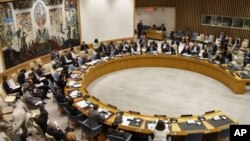The problems facing the world today are “notoriously resistant to unilateral solutions,” said U.S. Deputy Secretary of State Antony Blinken in a recent address in New York.
Mr. Blinken spoke days before the opening of the 71st meeting of the U.N. General Assembly. He said the national interest of the United States demands the global engagement that has been the hallmark of President Barack Obama’s administration – engagement built on the foundation of a system of rules, principles, and international institutions which the United States, as the world’s rising global power after the Second World War, helped establish. It is a system, not without problems, but which ”got the big picture right,” said Deputy Secretary Blinken, “averting new global cataclysms, ending the Cold War peacefully, creating the space and stability for countries to prosper.”
Under President Obama’s engagement policy, Mr. Blinken noted, the United States, among other instances, worked at the U.N. Security Council to advance nuclear negotiations with Iran and to destroy Syria’s declared strategic chemical weapons capacity.
Mr. Blinken offered examples of collaboration in human rights with our reengagement on the Human Rights Council, where we have shed light on some of the world’s worst human rights conditions and violators and work the U.S. has done with new leadership at the Organization of American States to strengthen that institution’s role in defending democracy and promoting human rights. Mr. Blinken stated we have reinvigorated our transatlantic partnerships and strengthened relationships with Asia’s key institutions and collaborative efforts in establishing a coalition of more than 67 countries to confront Daesh and undermine its vicious, phony caliphate.
“Working with others,” Deputy Secretary Blinken said, “we build a foundation of trust, greater alignment of interest, habits of cooperation, and greater legitimacy that better enables us to mobilize others against common threats and seize common opportunities.”
The bulk of U.S. global engagement happens at the United Nations, which, despite its flaws and its need for reform, Mr. Blinken called “the gold standard of global action” when mobilized effectively. “Now is the time to strengthen [the U.N.], to adapt it to new realities,” he said.
“The U.N. is worth fighting for,” said Deputy Secretary Blinken. “It ensures that our collective action better upholds our own promises. And it will help us shape and adopt an international system that actually lives up to the vision of those who first built it: a global project that remains now, as it did then, indispensable to the health, the strength, the security , the prosperity of every nation, especially the United States.”












